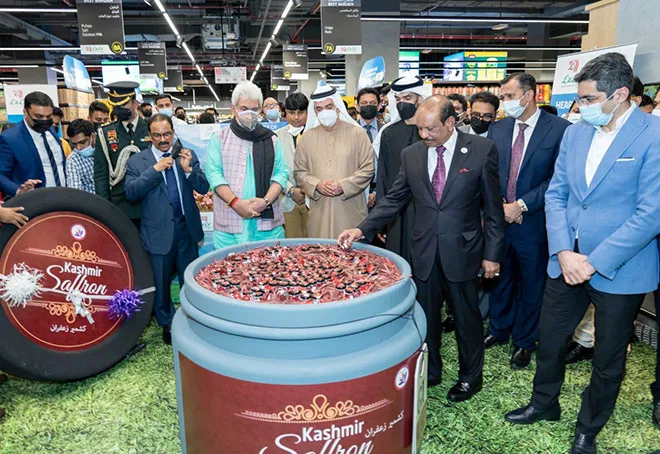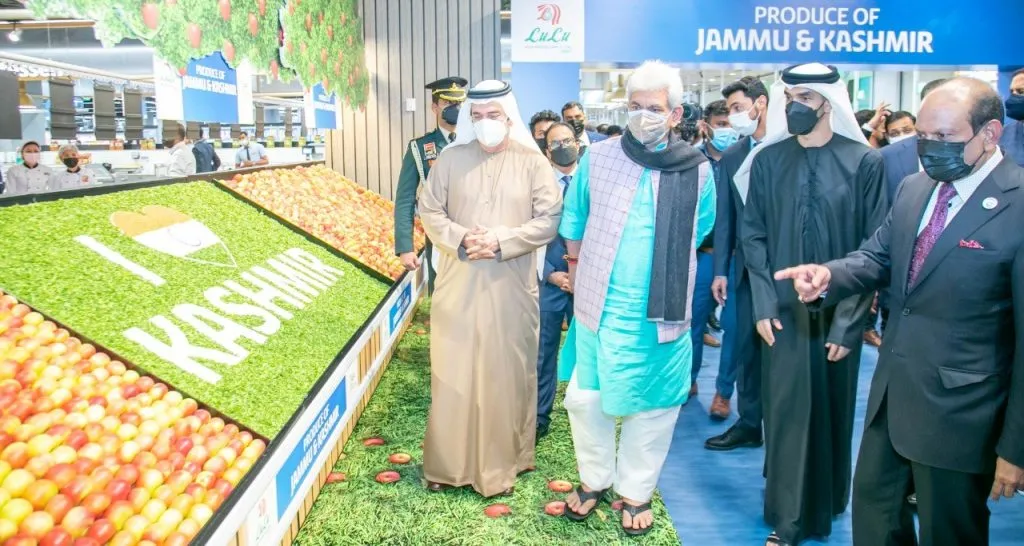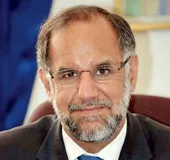
When
Shri Manoj Sinha, Lieutenant Governor (LG) of Jammu & Kashmir, visited the United Arab Emirates (UAE) on 6-7 January 2022, it wasn’t just to mark the J&K Week at India Pavilion in the ongoing Dubai Expo. His meetings with key business and government leaders marked an important milestone in the government’s efforts to attract foreign direct investment into the Union Territory and boost economic development after Article 370 was revoked on 5 August 2019. It is striking that the LG’s investment promotion efforts focused on UAE and not on any of the G7 economies.
The genesis of this development lies in the close strategic partnership that has developed between India and UAE since Prime Minister Modi broke the ice in August 2015. His visit to Abu Dhabi, the first by a sitting Indian Prime Minister since 1981, was critical for creating a personal rapport with UAE’s de facto ruler Sheikh Mohammed bin Zayed. Over the last decade or so, Sheikh Mohammed has established a reputation for being a strong and decisive leader who does not shy away from taking a position on a tough issue. This was on display when UAE invited late
Mrs Sushma Swaraj to be Guest of Honour at the 46
th session of the Council of Ministers meeting of the Organization of Islamic Cooperation in Abu Dhabi on 1 March 2019. Blindsided by the development and apoplectic that it came within a couple of days of the Balakot airstrike on 26 February, Pakistan protested bilaterally to UAE and used its considerable leverage within the OIC to try and thwart the move. But the Emirati leadership resolutely refused to buckle under the pressure. Pakistan registered its protest by boycotting the opening session, leaving their seat vacant even as India occupied the high table.
Blindsided by the development and apoplectic that it came within a couple of days of the Balakot airstrike on 26 February, Pakistan protested bilaterally to UAE and used its considerable leverage within the OIC to try and thwart the move.
Barely five months later, Article 370 of India’s Constitution was revoked in a move that again took Pakistan by surprise. They tried to rally OIC members and rustle up some kind of condemnation of India but this was countered by some deft diplomacy by New Delhi. In a carefully worded statement issued on 6 August 2019, Abu Dhabi became the first Arab nation to comment on the subject, saying that they had taken note of the development and saw the ‘decision related to the state of Jammu and Kashmir as an internal matter as stipulated by the Indian Constitution.’ Any doubts that Pakistan might have harboured on UAE’s position were quickly laid to rest on 24 August, when Prime Minister Modi visited Abu Dhabi to receive the Order of Zayed, the country’s highest civilian award.
Over the course of the last two years, Islamabad has played every card from its playbook to enlist the support of Saudi Arabia and other Gulf nations but to no avail. When Riyadh refused it’s overtures to call for a special session of OIC foreign ministers to mark one year of the revocation of Article 370, Pakistan resorted to a more desperate ploy. It suggested that it might work with like-minded countries like Turkey and Malaysia that were more supportive of the idea. But this, too, backfired badly as Riyadh reacted by freezing a US $3.2 billion oil credit facility and demanding early repayment of loans worth US $3 billion in August 2020. The chasm between Islamabad’s typically blustering rhetoric and the reality of its fragile economic situation was evident when Gen. Bajwa was forced to make an emergency trip to Riyadh to mollify the Saudis.
Beyond the ambitious project proposals, the real significance of the MoU lay in its ‘official’ underpinning—the fact that it was signed by Mohammed Ibrahim Al Shaibani, Director General of the Ruler’s Court in the Government of Dubai and Ranjan Prakash Thakur, Principal Secretary, Industry in the Government of J &K.
The emergence of a conducive external environment, combined with the relatively stable security situation on the ground, has enabled the government to initiate several bold steps aimed at stimulating economic development. During the visit of Home Minister Amit Shah to the Kashmir valley in October 2021, Srinagar hosted a high-level delegation from Dubai to discuss major investment proposals. A
Press Information Bureau (PIB) release said on 18 October that “Jammu and Kashmir administration today signed a Memorandum of Understanding (MoU) with the Government of Dubai for real estate development, industrial parks, IT towers, multipurpose towers, logistics, medical college, super specialty hospital and more.” Beyond the ambitious project proposals, the real significance of the MoU lay in its ‘official’ underpinning—the fact that it was signed by Mohammed Ibrahim Al Shaibani, Director General of the Ruler’s Court in the Government of Dubai and Ranjan Prakash Thakur, Principal Secretary, Industry in the Government of J &K.
The reaction in Pakistan was predictable. Analysts blamed the establishment for losing the support of Gulf allies, while social media hawks lashed out at the leadership in Abu Dhabi with a #BoycottUAE campaign. Former diplomat Abdul Basit, who served as High Commissioner to Delhi from 2014-17 captured the Pakistani sentiment in his YouTube vlog, saying, "This
is a major success for India in the context of both Pakistan and Jammu and Kashmir as OIC members have always kept Pakistan's sensibilities on Kashmir at the forefront….In the past, they have never done something to make Pakistan feel that Muslim nations and the OIC are not standing behind us on the Kashmir issue. They may not have been very vocal, but have ensured not to work against our sentiment on Kashmir."
Collaboration on multiple fronts
The visit of LG Manoj Sinha to Dubai in January was important to follow up on the October meetings in Srinagar and to advance the strategic objectives of the nascent collaboration with UAE. Of the various investment commitments finalised during his visit, three stand out for their economic significance as much as for their political symbolism:
Emaar is one of the Middle East’s largest real estate groups and its portfolio includes the iconic Burj Khalifa in Dubai. It was fully owned by the Government of Dubai until its IPO in 2000 and the government remains the largest single shareholder with a 24.3 percent holding. They have committed to build a massive 500,000 square foot ‘Emaar Mall of Srinagar.’ A 15-acre plot has been identified and work is likely to begin shortly. Mohamed Alabbar, Founder and Chairman of the Emaar group said: “We wish to bring a world class mall experience to the residents of Jammu and Kashmir and to the tourist inflows which are likely to increase exponentially….Emaar is also considering other investments into real estate, hospitality and mixed-use commercial and residential projects in Jammu and in Srinagar.”
 DP World is one of the world’s largest shipping and logistics companies and already has a major presence in India through its container terminals and inland container depots. It is owned by the Government of Dubai and its Jebel Ali Free Zone has played a vital role in making Dubai the hub of regional trade. DP World has committed to establish a multi-modal inland container terminal and cold storage facilities in J&K that could go a long way in bringing Kashmiri products to national and global markets. Speaking to the Srinagar media after signing the MoU in October, Sultan Ahmed Bin Sulayem, Chairman and CEO of DP World hinted that he was fully aware of the challenges that might be posed by Pak-supported terrorist groups. “We are committed to connect Jammu and Kashmir to the rest of India. We know how to do that; we know the obstacles.”
The Lulu Group, established in Abu Dhabi by Kerala-born Yusuff Ali MA, has become the largest retail group in the Middle East. Its network of over 220 Lulu hypermarkets can offer a ready-made market for horticulture, fresh produce, handicrafts, and other products from J&K. Speaking in the presence of LG Manoj Sinha and Dr Thani Al Zeyoudi, UAE’s Minister for Foreign Trade, Yusuff Ali said that his group plans to invest INR 200 crores in the first phase and has earmarked a similar amount for further expansion to set up a food processing and packaging facility and a hypermarket, adding that these would give considerable employment opportunities to local youth and would also help the local farming community. Dr Thani said that this would enhance trade relations between J&K and UAE and that he would “look forward to the inauguration of the Lulu Processing Centre in Srinagar soon.” The accompanying picture showing the launch of GI-tagged saffron from Kashmir in the presence of senior representatives of the two governments at a Lulu hypermarket in Dubai carried its own message.
DP World is one of the world’s largest shipping and logistics companies and already has a major presence in India through its container terminals and inland container depots. It is owned by the Government of Dubai and its Jebel Ali Free Zone has played a vital role in making Dubai the hub of regional trade. DP World has committed to establish a multi-modal inland container terminal and cold storage facilities in J&K that could go a long way in bringing Kashmiri products to national and global markets. Speaking to the Srinagar media after signing the MoU in October, Sultan Ahmed Bin Sulayem, Chairman and CEO of DP World hinted that he was fully aware of the challenges that might be posed by Pak-supported terrorist groups. “We are committed to connect Jammu and Kashmir to the rest of India. We know how to do that; we know the obstacles.”
The Lulu Group, established in Abu Dhabi by Kerala-born Yusuff Ali MA, has become the largest retail group in the Middle East. Its network of over 220 Lulu hypermarkets can offer a ready-made market for horticulture, fresh produce, handicrafts, and other products from J&K. Speaking in the presence of LG Manoj Sinha and Dr Thani Al Zeyoudi, UAE’s Minister for Foreign Trade, Yusuff Ali said that his group plans to invest INR 200 crores in the first phase and has earmarked a similar amount for further expansion to set up a food processing and packaging facility and a hypermarket, adding that these would give considerable employment opportunities to local youth and would also help the local farming community. Dr Thani said that this would enhance trade relations between J&K and UAE and that he would “look forward to the inauguration of the Lulu Processing Centre in Srinagar soon.” The accompanying picture showing the launch of GI-tagged saffron from Kashmir in the presence of senior representatives of the two governments at a Lulu hypermarket in Dubai carried its own message.
The central government has done well by designating Srinagar a Major Airport but could now go a step further by allowing private jets to come directly.
The other significant development was the launch of a direct Srinagar-Sharjah flight by Go First. Pakistan again demonstrated its pique by denying overflight clearance and adding 40 minutes to the travel time. That didn’t prevent the flight from becoming an instant hit, providing a smooth connection to the Gulf not only for residents of the valley but also for fresh produce and horticultural products. Although temporarily impacted by the Omicron-linked restrictions, the flight could become a key part of the emerging links with UAE. The central government has done well by designating Srinagar a Major Airport but could now go a step further by allowing private jets to come directly. This would enable prominent business leaders like Mohammed Alabbar, Sultan bin Sulayem and Yusuff Ali to fly into Srinagar in their own jets to monitor the progress of their projects.
At the political level, the essential groundwork has been done. The next few months will now be crucial in terms of the handholding and facilitation needed from Delhi and Srinagar to translate these projects into reality. Their success will create a powerful demonstration effect that could attract other investors and provide a real boost to the Kashmiri economy. The spoilers will try to make things difficult but their designs will be foiled if the government keeps a single-minded focus on execution. Quite unexpectedly, India’s strategic partnership with UAE could provide a silver lining for Jammu and Kashmir.
The views expressed above belong to the author(s). ORF research and analyses now available on Telegram! Click here to access our curated content — blogs, longforms and interviews.



 When
When
 PREV
PREV


